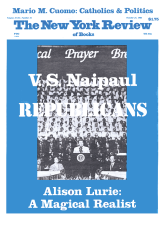In response to:
Nuclear Fantasies from the June 14, 1984 issue
To the Editors:
Lord Zuckerman appears to have set forth, in his review of The Abolition, Jonathan Schell’s means for abolishing nuclear weapons: “agree to agree.” It is rather difficult to believe that Schell would write a book, The New Yorker serialize it, and Knopf publish it that merely recommended a treaty to abolish nuclear weapons, something most everyone has urged since World War II. In fact, that is not the heart of The Abolition. Lord Zuckerman has simply ignored Schell’s argument—because, I suspect, he has no answer for it.
Schell declares that nuclear weapons are no longer needed because they can still fulfill their deterrent function without actually being in existence. That is because the knowledge of nuclear weapons and the ability to produce them will always be with us (unless we destroy such knowledge and ability, perhaps only temporarily, in a nuclear holocaust). Therefore, if we are serious in our stated claims that nuclear weapons must never be used except as threats to deter others, we could now dismantle the weapons. We would thus have retreated significantly from the nuclear brink and the accidents and momentary passions that threaten to push us over it. Schell hopes that technical experts could assure us that we could still maintain the deterrent credibility of nuclear weapons if we were still able to rearm ourselves in about a month to respond to whatever threats might be perceived.
When The Abolition was first printed in The New Yorker some months ago, I had eagerly awaited the responses of the critics, especially those who like Lord Zuckerman are knowledgeable about the nuclear quandary and are actors in the governmental establishments possessing nuclear weapons. I had not imagined that, as in two of the first three reviews of the book that I’ve seen, the response to Schell’s principal argument, his reason for writing the book, would be to ignore it. Why this evasion?
If Schell’s argument is flawed, or even ridiculous, could not Lord Zuckerman demonstrate its fallaciousness? What purports to be a review of The Abolition ought to be, by definition, a critique of the book’s argument.
We powerless, almost helpless citizens want to know why those in power will not or cannot give up their nuclear weapons when it would appear, if Schell is correct, that the actual weapons aren’t necessary to serve their deterrent function. Are the architects of nuclear deterrence possibly afraid of losing their own powers over us of life and death should such a dismantlement occur? But perhaps Schell is wrong. Can Lord Zuckerman say why?
John Clarke
Bronx, New York
Lord Zuckerman replies:
Mr. Silins makes two points, both of which I find obscure. The first relates to the abstract distinction between “first use” and “first strike.” The latter I take to mean a deliberate launch, without warning, of nuclear ballistic missiles. The term “first use” is now used to mean recourse to nuclear weapons in a war which had started with the engagement of forces using only so-called conventional weapons.
As I see it, neither the USA nor the USSR now has the power to disarm the other. I cannot therefore imagine what evidence Mr. Dyson has that the Soviets or, indeed, the United States, would launch a first strike, given that the likely response would be a nuclear counterstrike. Whoever struck first would be committing suicide. This could hardly be deemed a rational act, although that is not to say that some governments could not behave irrationally, or that accidents could not occur.
So far as “first use” is concerned, the Russians have declared publicly that they will not be the first to use nuclear weapons were they to be engaged in a war against NATO forces. On the other hand, the authorities who speak for the NATO command have refused to make any corresponding declaration, even though doing so would cost little and have little binding power. I cannot see how an examination of Soviet policy on these matters would serve any purpose.
Mr. Silins writes that the United States has “flirted” with first use by “deploying tactical nuclear weapons.” This takes me to his second point. It is historically incorrect to imply that nuclear weapons were considered at the end of the Forties and in the early Fifties as anything except explosive devices which, in the immortal words of, I believe, Mr. Truman, gave “more bang for a buck.” They were added to the NATO armory as they became available, and would have been used had the Russians encroached on NATO-held territory. Mr. Silins’s own perceptions may have been changed by the fact that technological advances have been made in nuclear weaponry. Mine have not. There is no reason to suppose that a nuclear conflict would be any more controllable today than it would have been, say, twenty-five years ago.
I have no answer to what Mr. Clarke says is Jonathan Schell’s argument; namely, that nuclear weapons are no longer needed because they can still fulfill their deterrent function without being actually in existence. The reality with which we have to live is that the “we” referred to in the middle of Mr. Clarke’s second paragraph—whether Russians, Americans, British, Chinese, or French—are not prepared to dismantle their nuclear weapons systems. This they will not do for a variety of reasons, including the impossibility of a country being able to rearm itself with nuclear weapons “in about a month,” given that it had got rid of all it had before. Alas, the world is as it is, and not as Mr. Schell and Mr. Clarke would have it.
This Issue
October 25, 1984



